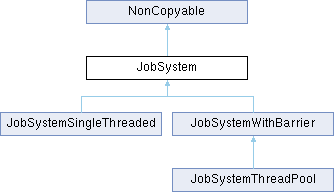 |
Jolt Physics
A multi core friendly Game Physics Engine
|
 |
Jolt Physics
A multi core friendly Game Physics Engine
|
#include <JobSystem.h>

Classes | |
| class | Barrier |
| A job barrier keeps track of a number of jobs and allows waiting until they are all completed. More... | |
| class | Job |
| A class that contains information for a single unit of work. More... | |
| class | JobHandle |
Public Types | |
| using | JobFunction = function<void()> |
| Main function of the job. | |
Public Member Functions | |
| virtual | ~JobSystem ()=default |
| Destructor. | |
| virtual int | GetMaxConcurrency () const =0 |
| Get maximum number of concurrently executing jobs. | |
| virtual JobHandle | CreateJob (const char *inName, ColorArg inColor, const JobFunction &inJobFunction, uint32 inNumDependencies=0)=0 |
| virtual Barrier * | CreateBarrier ()=0 |
| Create a new barrier, used to wait on jobs. | |
| virtual void | DestroyBarrier (Barrier *inBarrier)=0 |
| Destroy a barrier when it is no longer used. The barrier should be empty at this point. | |
| virtual void | WaitForJobs (Barrier *inBarrier)=0 |
| Wait for a set of jobs to be finished, note that only 1 thread can be waiting on a barrier at a time. | |
 Public Member Functions inherited from NonCopyable Public Member Functions inherited from NonCopyable | |
| NonCopyable ()=default | |
| NonCopyable (const NonCopyable &)=delete | |
| void | operator= (const NonCopyable &)=delete |
Protected Member Functions | |
| virtual void | QueueJob (Job *inJob)=0 |
| Adds a job to the job queue. | |
| virtual void | QueueJobs (Job **inJobs, uint inNumJobs)=0 |
| Adds a number of jobs at once to the job queue. | |
| virtual void | FreeJob (Job *inJob)=0 |
| Frees a job. | |
A class that allows units of work (Jobs) to be scheduled across multiple threads. It allows dependencies between the jobs so that the jobs form a graph.
The pattern for using this class is:
// Create job system
JobSystem *job_system = new JobSystemThreadPool(...);
// Create some jobs
JobHandle second_job = job_system->CreateJob("SecondJob", Color::sRed, []() { ... }, 1); // Create a job with 1 dependency
JobHandle first_job = job_system->CreateJob("FirstJob", Color::sGreen, [second_job]() { ....; second_job.RemoveDependency(); }, 0); // Job can start immediately, will start second job when it's done
JobHandle third_job = job_system->CreateJob("ThirdJob", Color::sBlue, []() { ... }, 0); // This job can run immediately as well and can run in parallel to job 1 and 2
// Add the jobs to the barrier so that we can execute them while we're waiting
Barrier *barrier = job_system->CreateBarrier();
barrier->AddJob(first_job);
barrier->AddJob(second_job);
barrier->AddJob(third_job);
job_system->WaitForJobs(barrier);
// Clean up
job_system->DestroyBarrier(barrier);
delete job_system;
Jobs are guaranteed to be started in the order that their dependency counter becomes zero (in case they're scheduled on a background thread) or in the order they're added to the barrier (when dependency count is zero and when executing on the thread that calls WaitForJobs).
If you want to implement your own job system, inherit from JobSystem and implement:
JobSystem::Barrier is used to track the completion of a set of jobs. Jobs will be created by other jobs and added to the barrier while it is being waited on. This means that you cannot create a dependency graph beforehand as the graph changes while jobs are running. Implement the following functions:
The functions on JobSystem that need to be implemented to support barriers are:
An example implementation is JobSystemThreadPool. If you don't want to write the Barrier class you can also inherit from JobSystemWithBarrier.
| using JobSystem::JobFunction = function<void()> |
Main function of the job.
|
virtualdefault |
Destructor.
|
pure virtual |
Create a new barrier, used to wait on jobs.
Implemented in JobSystemSingleThreaded, and JobSystemWithBarrier.
|
pure virtual |
Create a new job, the job is started immediately if inNumDependencies == 0 otherwise it starts when RemoveDependency causes the dependency counter to reach 0.
Implemented in JobSystemSingleThreaded, and JobSystemThreadPool.
|
pure virtual |
Destroy a barrier when it is no longer used. The barrier should be empty at this point.
Implemented in JobSystemSingleThreaded, and JobSystemWithBarrier.
|
protectedpure virtual |
Frees a job.
Implemented in JobSystemSingleThreaded, and JobSystemThreadPool.
|
pure virtual |
Get maximum number of concurrently executing jobs.
Implemented in JobSystemSingleThreaded, and JobSystemThreadPool.
|
protectedpure virtual |
Adds a job to the job queue.
Implemented in JobSystemSingleThreaded, and JobSystemThreadPool.
Adds a number of jobs at once to the job queue.
Implemented in JobSystemSingleThreaded, and JobSystemThreadPool.
|
pure virtual |
Wait for a set of jobs to be finished, note that only 1 thread can be waiting on a barrier at a time.
Implemented in JobSystemSingleThreaded, and JobSystemWithBarrier.